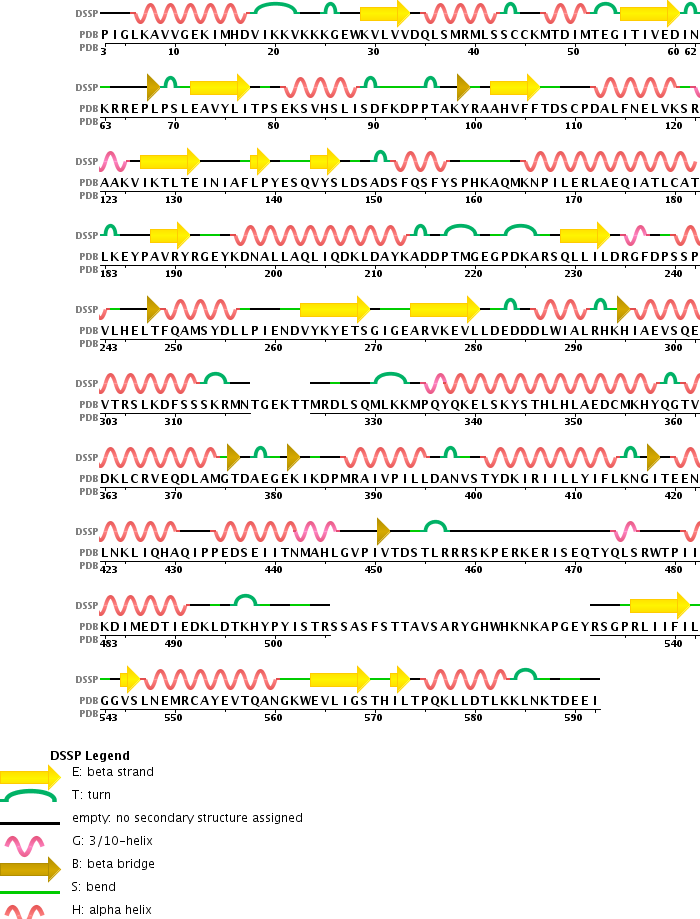We apologize for Proteopedia being slow to respond. For the past two years, a new implementation of Proteopedia has been being built. Soon, it will replace this 18-year old system. All existing content will be moved to the new system at a date that will be announced here.
Sandbox Reserved 1242
From Proteopedia
(Difference between revisions)
| Line 2: | Line 2: | ||
==Syntaxin-Binding Protein 1 Structure== | ==Syntaxin-Binding Protein 1 Structure== | ||
<StructureSection load='4JEU' size='340' side='right' caption='STXBP1 in Rattus Norvegicus' scene=''> | <StructureSection load='4JEU' size='340' side='right' caption='STXBP1 in Rattus Norvegicus' scene=''> | ||
| - | Syntaxin-Binding Protein 1 (STXBP1), encoded by a gene on chromosome 9 of the same name, is a protein considered part of the Sec1/Munc18 family of proteins. In the picture on the right, there are actually two chains, A and B. These chains represent two sequence-unique entities. Chain A (pictured in grey), which is the STXBP1 strand, consists of 590 amino acid residues. Of these, 248 residues make up 26 alpha helices while 80 residues make up 23 strands of beta sheet. This peptide chain is in the L conformation meaning it is a mirror image of the D conformation while maintaining the same sequence. Chain B (pictured in green) is actually syntaxin A1 already bound to the STXBP1, and it contains 242 total residues. 170 residues make up 8 alpha helices here and one residue is responsible for one beta sheet. This peptide is also in the L conformation. These two chains can be bound in two different ways: to the N-terminus which is thought to cause interactions with SNARE proteins, and via a "closed" conformation which is thought to inhibit interactions. | + | Syntaxin-Binding Protein 1 (STXBP1), encoded by a gene on chromosome 9 of the same name, is a protein considered part of the Sec1/Munc18 family of proteins. In the picture on the right, there are actually two chains, A and B. These chains represent two sequence-unique entities. Chain A (pictured in grey), which is the STXBP1 strand, consists of 590 amino acid residues. Of these, 248 residues make up 26 alpha helices while 80 residues make up 23 strands of beta sheet. This peptide chain is in the L conformation meaning it is a mirror image of the D conformation while maintaining the same sequence. |
| + | [[Image:IMG 0202.PNG]] | ||
| + | Chain B (pictured in green) is actually syntaxin A1 already bound to the STXBP1, and it contains 242 total residues. 170 residues make up 8 alpha helices here and one residue is responsible for one beta sheet. This peptide is also in the L conformation. These two chains can be bound in two different ways: to the N-terminus which is thought to cause interactions with SNARE proteins, and via a "closed" conformation which is thought to inhibit interactions. | ||
== Function == | == Function == | ||
STXBP1 is responsible for the regulation of membrane fusion through interactions with the family of SNARE proteins, syntaxin (a transmembrane attachment protein receptor). This is necessary for neurotransmission. The syntaxin assembles SNARE complexes which contain an open conformation of syntaxin A1. This complex or a closed formation of syntaxin A1 interact with STXBP1 causing and inhibiting interactions respectively. It is also said to participate in regulating synaptic vesicle docking and fusion. Likely, this is the result of GTP-binding involvement. | STXBP1 is responsible for the regulation of membrane fusion through interactions with the family of SNARE proteins, syntaxin (a transmembrane attachment protein receptor). This is necessary for neurotransmission. The syntaxin assembles SNARE complexes which contain an open conformation of syntaxin A1. This complex or a closed formation of syntaxin A1 interact with STXBP1 causing and inhibiting interactions respectively. It is also said to participate in regulating synaptic vesicle docking and fusion. Likely, this is the result of GTP-binding involvement. | ||
Revision as of 08:24, 8 May 2017
| This Sandbox is Reserved from Jan 17 through June 31, 2017 for use in the course Biochemistry II taught by Jason Telford at the Maryville University, St. Louis, USA. This reservation includes Sandbox Reserved 1225 through Sandbox Reserved 1244. |
To get started:
More help: Help:Editing |
Syntaxin-Binding Protein 1 Structure
| |||||||||||

